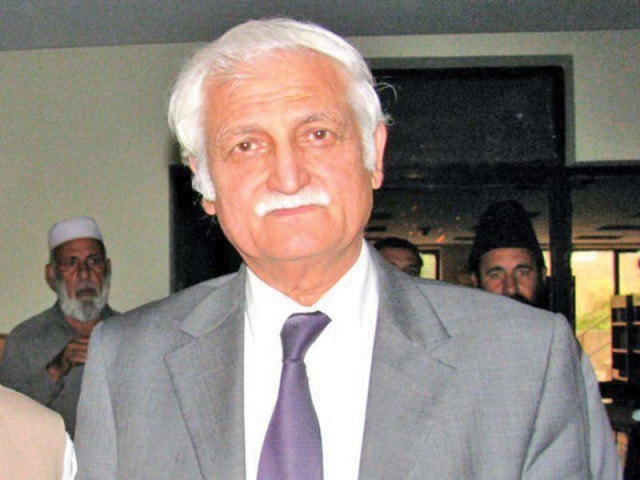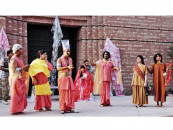Differences emerge in PML-N over scope of accountability
PPP Senator Farhatullah Babar resigns from panel on NAC

Farhatullah Babar. PHOTO: FILE
On the other hand, all-guns-blazing Pakistan Peoples Party (PPP) Senator Farhatullah Babar also tendered his resignation from the parliamentary committee on the National Accountability Commission (NAC) Bill, 2017 after his party backed off from the proposal of bringing judges and generals under the purview of the new law.
The bill was being prepared to replace the National Accountability Ordinance (NAO), 1999.
Babar had floated the proposal of accountability for all but his suggestion failed to muster a broad-based support in the committee. The senator, who did not attend the last three meetings of the committee, tendered his resignation in the fourth meeting.
Difference emerges: Stop disrespecting institutions, Shehbaz tells party leaders
The 18th in-camera meeting presided over by Minister for Law and Justice Zahid Hamid turned out to be a huddle that made the differences within the PML-N all the more obvious.
Similarly, members belonging to other parties also demanded accountability for all.
PML-N’s vociferous lawmaker from Khyber-Pakhtunkhwa Javed Abbasi expressed reservations over the non-inclusion of judges and generals from the ambit of commission.
Surprise return: Sharif is back — to face accountability
Abbasi chairs the Senate standing committee on law and justice and has been quite vocal against any law that would exclude the military or judiciary from accountability.
The law minister after the meeting refuted to have discussed anything about the accountability of judges and generals and said a few members had divergent views over the issue and they would seek their party’s stance and voting would be held next time.
Hamid insisted that there was only one member from the ruling party who talked about the accountability for all but he asked to consult the party.
PML-N fails to settle on cabinet picks
Minister for Information Technology Anusha Rahman later came to the reporters to ‘clarify the confusion’ and said only Abbasi from the PML-N held that view along with some other members of the committee.
Abbasi did not take questions when contacted on phone. However, on Wednesday while commenting at a conference on the issue said that it would be parliament’s biggest failure if no legislature on a new, effective, credible accountability law for all was made.
He was speaking at a roundtable discussion on ‘Reforms in Accountability System of Pakistan’ along with Babar, who also stated that the no agreement over across-the-board accountability was akin to surrender in East Pakistan.
Post governorship: PML-N’s boat in rough waters as internal differences emerge
When contacted, the PPP senator refused to comment, saying “I should not talk about my resignation to avoid creating difficulties.”
Interestingly, all the three parties – the Pakistan Tehreek-e-Insaf, Muttahida Qaumi Movement and Jamaat-e-Islami – had already raised objections to the bill during previous meetings of the committee.
While the PPP in the 15th meeting of the committee took a U-turn and backed off from the proposal of Babar.
Struggle for influence: Informal powerhouses emerging within PML-N
The PTI has also submitted 13 amendments, to the law – including defining the term ‘holder of public office’. It said the term includes everyone – from chairman of a municipal corporation to the president of Pakistan – except ‘a person who is a member of any of the armed forces of Pakistan’.
The existing accountability ordinance was promulgated by former president Gen (retd) Pervez Musharraf in 1999 that had brought public office-holders, civil servants, politicians and even civilians under the law, but exempted staffers of armed forces personnel and judges from being held accountable.



















COMMENTS
Comments are moderated and generally will be posted if they are on-topic and not abusive.
For more information, please see our Comments FAQ